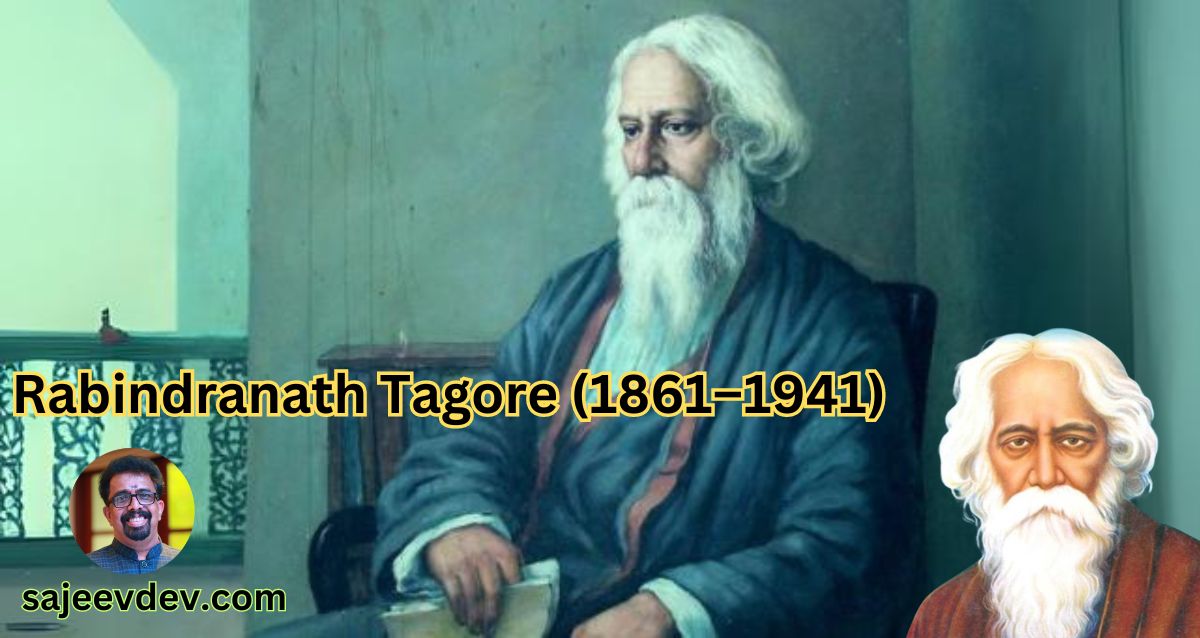Rabindranath Tagore, born in 1861, remains a towering figure in modern Indian literature
Rabindranath Tagore, born in 1861, remains a towering figure in modern Indian literature. Hailing from a culturally rich Bengali Brahmin family, Tagore’s early exposure to literature and the arts had a profound impact on his creative development. His father, Debendranath Tagore, was a prominent figure in the Brahmo Samaj, a reformist movement that sought to modernize Indian society while emphasizing spiritual values. This familial background fostered an environment conducive to intellectual growth and artistic exploration, which would later become evident in Tagore’s works.
Throughout his life, Tagore was not only a poet but also a playwright, philosopher, and musician, allowing him to weave diverse influences into his writing. His literary journey began at a young age, with his first poetry collection published when he was just 17 years old. Tagore’s multifaceted talents were recognized early, and he quickly became a central figure in Bengali literature. His unique style, characterized by lyrical beauty and profound philosophical insights, resonated deeply with readers, both in India and abroad.
Perhaps one of Tagore’s most significant achievements was being the first non-European to win the Nobel Prize in Literature in 1913. This accolade brought global recognition to his work and introduced the world to the richness of Indian poetry and prose. His most renowned collection, “Gitanjali,” features verses that explore themes of love, nature, and spirituality, reflecting his profound connection to Indian culture and philosophy. Tagore’s contributions to literature extend beyond poetry; he was also a critical thinker who engaged with contemporary social issues through his writings. This introduction to Rabindranath Tagore serves as a foundation for understanding how his legacy continues to inspire and shape literature today.
Tagore’s Unique Literary Style
Rabindranath Tagore’s literary style is often celebrated for its lyrical beauty and profound philosophical depth. His unique approach to writing seamlessly blends poetic expressions with compelling themes that resonate deeply with readers. Central to Tagore’s work is the harmonic integration of spirituality, humanism, and patriotism, which together form the bedrock of his literary expression. This distinctive synthesis allows his readers to explore complex emotional landscapes while engaging with broader societal issues.
Tagore’s poetry frequently embodies a deep reverence for nature, which acts as a mirror reflecting the inner workings of human emotion. His verses often depict the transcendental connections between humanity and the divine, illustrating a spiritual quest that is both personal and universal. In works like “Gitanjali,” he explores the intimate relationship between the self and the cosmos, encouraging readers to seek a deeper understanding of existence. Such themes present not only a spiritual awakening but also a call to embrace life’s profound experiences, collectively enhancing the reader’s engagement with his lyrical mastery.
Furthermore, Tagore’s humanistic ideals play a significant role in his writing, as he often addresses the plight of the downtrodden and the importance of social justice. This aspect of his work reflects his commitment to human dignity and the flourishing of individual potential, aligning with contemporary movements for social reform. His sense of nationalism, infused with a love for his country, is another distinguishing feature, as he used his literary prowess to inspire collective action towards liberation from colonial rule.
Ultimately, Tagore’s unique literary style not only sets him apart from his contemporaries but also solidifies his role as a transformative figure in modern Indian literature. His ability to weave together diverse themes with elegance and depth continues to inspire readers and writers alike, affirming his lasting legacy in the literary world.
Gitanjali: A Spiritual Odyssey
Rabindranath Tagore’s Gitanjali is not merely a collection of poems; it is a profound exploration of the human spirit and its relationship with the divine. Comprised of 103 poems originally written in Bengali and subsequently translated by the author into English, Gitanjali transcends linguistic and cultural barriers to resonate with a global audience. At the heart of this work lies a deep, spiritual quest—one that encapsulates themes of divine love, self-discovery, and the intricate connection between the human soul and the universe.
Throughout Gitanjali, Tagore articulates his vision of divine love as an omnipresent force, suggesting that the seeker is perpetually in search of spiritual fulfillment. This quest often reflects a yearning for unity with the divine, as demonstrated in verses that evoke imagery of nature, love, and the cosmos. Tagore uses metaphors and symbols effectively to illustrate this connection, fostering a sense of introspection and introspective enlightenment. His poems often encapsulate moments of quiet contemplation where the individual recognizes the divine within and around them, thereby enhancing the reader’s experience of the overarching themes.
One of the remarkable aspects of Gitanjali is Tagore’s ability to express the profound emotion of individuality within a universal framework. In his poetry, the personal journey of self-discovery mirrors the collective search for meaning and connection, highlighting the universality of the human experience. For instance, several poems dwell on the transient nature of life and the inevitability of loss, yet they also celebrate the joy of existence and the beauty of spiritual awakening. This intricate dance between the personal and the universal not only deepens the reader’s understanding of Tagore’s philosophy but also showcases the potential for a universal connection that transcends boundaries.
In essence, Gitanjali serves as a spiritual odyssey, guiding its readers through an exploration of the soul’s journey towards unity with the divine. Tagore’s lyrical mastery and profound insights continue to inspire countless individuals, reminding them of their intrinsic connection to the universe and the higher powers that govern it.
Patriotism and Nationalism in Tagore’s Poetry
Rabindranath Tagore’s poetry embodies a profound connection to the themes of patriotism and nationalism, particularly during the turbulent years of British colonial rule in India. His verses reflect a deep love for his homeland and an unwavering belief in the power of a united nation. Through his poetic works, Tagore expressed the aspirations of the Indian people, capturing their struggles and dreams in the fight for freedom and self-determination.
One of Tagore’s most notable works is “Chitto Jetha Bhayshunyo,” a poem that calls for the awakening of national consciousness amidst the pervasive atmosphere of colonialism. In this piece, he articulates a vision of an India where fear and division are replaced by boldness and unity. Tagore’s lyrics resonate with the spirit of resistance and are often viewed as a rallying cry for those yearning for independence. His portrayal of an inclusive and harmonious society fosters a sense of national pride and belonging, transcending regional and communal divides.
Another significant poem, “Where the Mind is Without Fear,” articulates a yearning for an India free from oppression and ignorance. Here, Tagore invokes the imagery of a liberated mind, indicating that true patriotism is rooted in the pursuit of knowledge and the nurturing of human potentials. His ability to intertwine the personal with the national enhances the emotional weight of his works, inviting readers to reflect on their identity in relation to their nation.
Tagore’s poetry not only resonates with the struggles of his time but continues to inspire contemporary thought on nationalism and unity. Through his literary contributions, he cultivates a deeper understanding of patriotism, advocating for a collective identity that embraces diversity and seeks to foster peace. As such, Tagore’s legacy remains significant in contemporary discussions surrounding nationalism, patriotism, and the ongoing quest for independence.
Tagore’s Influence on Eastern Literary Traditions
Rabindranath Tagore, a towering figure in modern Indian literature, profoundly impacted Eastern literary traditions, particularly Bengali literature and culture. His work laid the foundation for a literary renaissance in India during the late 19th and early 20th centuries. Tagore’s poetry, plays, and prose not only reflect a unique aesthetic quality but also encapsulate the socio-political consciousness of his time, addressing issues of justice, identity, and freedom.
One of the most significant contributions of Tagore to Bengali literature was his ability to amalgamate various styles and forms, enriching the literary landscape. He introduced lyrical beauty and philosophical depth into literature, often drawing inspiration from traditional folk cultural elements. His collection of poems, “Gitanjali,” is a prime example of how he synthesized classical poetic forms with modern themes, making profound philosophical inquiries accessible. This approach resonated with the prevailing nationalistic fervor, as many sought to reclaim their cultural identity during British colonial rule.
Furthermore, Tagore’s role in the revival of Indian literature cannot be overstated. He encouraged contemporary and future writers to explore and express their own cultural heritage, urging a return to indigenous themes and narratives. His emphasis on individuality and self-expression paved the way for a generation of literary giants, including Kazi Nazrul Islam and Jibanananda Das, who drew upon Tagore’s aesthetics while developing their unique styles. The emergence of these writers indicates the lasting influence of Tagore’s ideals upon Eastern literary traditions.
In essence, Tagore’s contributions extend beyond mere literary output; he offered a framework upon which subsequent authors could build. The themes of humanity, love, and spirituality prevalent in his work continue to inspire writers across genres and cultures, ensuring that his legacy endures in the vibrant tapestry of Eastern literature.
Tagore’s Impact on Western Literature
Rabindranath Tagore stands as a formidable figure in the realm of literature, transcending cultural and geographical boundaries with his profound literary contributions. His influence on Western literature is particularly noteworthy, as it facilitated a rich interplay between Eastern and Western literary traditions. The translation of Tagore’s works into various Western languages significantly broadened his readership, leading to heightened interest in Indian culture and philosophy. This exchange helped to bridge cultural divides, enabling Western audiences to appreciate the depths of Indian literary aesthetics.
One of the pivotal works that contributed to Tagore’s recognition in the West was the English translation of his poetry collection, “Gitanjali.” The translation, undertaken by the author himself, captured the lyrical beauty and philosophical depth of Tagore’s writing. This work garnered him the Nobel Prize in Literature in 1913, marking a significant milestone not only for Tagore but also for Indian literature as a whole. It opened the door for many Western authors to explore and embrace themes prevalent in Tagore’s work, such as spirituality, nature, and human connectivity.
Tagore’s impact resonates with notable Western literary figures, including W.B. Yeats, who was deeply influenced by Tagore’s writings. Yeats admired the emotional depth and mysticism present in Tagore’s poetry, often reflecting these qualities in his own works. Furthermore, the playwright and novelist Christopher Isherwood acknowledged the significance of Tagore’s explorations into identity and existence, integrating similar themes into his narratives. The reverberations of Tagore’s creativity continue to be felt, highlighting his unique role in not just enriching Indian literature but also expanding the horizons of Western literary thought.
Themes of Humanism in Tagore’s Work
Rabindranath Tagore, a luminary in modern Indian literature, intricately wove the theme of humanism into his poetry and prose. His writing transcended the typical boundaries of time and culture, inviting readers to engage with universal human experiences that resonate with the core of existence. Tagore’s belief in the intrinsic worth of every individual is most evident in his literary exploration of love, compassion, and social justice. He emphasized the interconnectedness of humanity, advocating for empathy as a foundational aspect of moral living.
In works such as “Gitanjali” and “The Home and the World,” Tagore illustrates the significance of understanding and cherishing the human spirit. His characters often grapple with inner turmoil and societal challenges, reflecting his keen awareness of the adversities faced by individuals in their quest for identity and belonging. The poet’s rich tapestry of emotions portrays a deep commitment to human dignity, where he passionately argues against inequities and the dehumanization that can stem from rigid social structures.
Moreover, Tagore’s humanitarian ideals encompass not only the struggles of the self but also extend to broader societal concerns. He wrote extensively on the importance of education, believing it to be a tool for empowerment. By advocating for an inclusive approach to learning, he underscored the necessity of nurturing one’s moral compass and fostering a sense of purpose aligned with the collective well-being of society. This advocacy for social justice remains deeply relevant today, as the issues Tagore addressed continue to persist in various forms across the world.
Ultimately, the humanistic themes in Tagore’s work present a compelling call to recognize our shared humanity. His literary legacy encourages readers to cultivate a sense of empathy towards others and to strive for societal improvement, embodying the essence of humanitarianism that Tagore fervently championed throughout his life.
Legacy and Modern Relevance of Tagore
Rabindranath Tagore’s legacy extends far beyond the literary realm; it permeates various aspects of modern Indian society, including spirituality, education, and human rights. His innovative approach to literature challenged traditional norms and offered a new voice that resonates with contemporary themes. By focusing on the necessity of self-exploration and respect for individuality, Tagore established a framework that continues to inspire modern thinkers and activists across the globe.
Tagore’s spiritual insights emphasize the interconnectedness of humanity. In an age marked by conflict and division, his vision of universal brotherhood and peace encourages a dialogue based on empathy and understanding. Many contemporary movements, notably those advocating for social justice and environmental sustainability, echo his ideals. These movements often draw from Tagore’s intrinsic belief in the sanctity of human rights, advocating for dignity and respect for all individuals regardless of their background.
In the realm of education, Tagore’s pioneering philosophy promotes experiential learning and the nurturing of creativity. He founded Visva-Bharati University with the intention of creating a holistic educational environment where students could articulate their unique talents. Today, this notion is gaining traction, with many educational reformers advocating for progressive pedagogies that prioritize critical thinking and emotional intelligence, aligning with Tagore’s vision.
Additionally, Tagore’s poetic expressions and deep reflections on nature resonate significantly with the current global focus on mental health and well-being. His belief in the healing power of art and nature serves as a guiding principle for contemporary discussions on wellness, encouraging individuals to connect with their environment and harness creativity as a vital tool for personal growth.
Tagore’s enduring influence is apparent in various cultural, educational, and social frameworks across the world, ensuring that his pioneering ideas remain significant in addressing modern challenges and fostering a more compassionate society.
Rabindranath Tagore’s influence on literature, culture, and society remains profound, asserting his position as a towering figure not only in Bengali literature but also in the global literary canon
Rabindranath Tagore’s influence on literature, culture, and society remains profound, asserting his position as a towering figure not only in Bengali literature but also in the global literary canon. His contributions span a multitude of forms, including poetry, prose, music, and visual arts, illustrating a unique fusion of creativity that transcends geographical boundaries and cultural divides. Tagore’s works address universal themes of love, humanity, nature, and self-discovery, showcasing a depth of insight that continues to resonate with readers today.
By blending traditional Indian literary forms with modernist ideas, Tagore pioneered a path that allowed for the exploration of contemporary issues while staying rooted in his cultural heritage. His iconic collection, “Gitanjali,” which earned him the Nobel Prize in Literature in 1913, exemplifies this synthesis. Tagore’s poetry not only captures the emotional and spiritual landscape of human experience but also invites readers to reflect on their own lives and the world around them.
Moreover, Tagore’s role as a cultural thinker and reformer extended beyond literature. He was an advocate for education and social reform, opening the Visva-Bharati University in Santiniketan, which encouraged an innovative approach to learning, marrying the arts with academic pursuits. Tagore’s vision emphasized the importance of holistic education, fostering an environment where creativity flourished and diverse ideas converged.
To fully appreciate the enduring impact of Tagore’s work, contemporary readers are encouraged to delve into his writings. Engaging with his poetry and prose offers valuable insights into not just the socio-political landscape of his time but also the timeless human emotions that remain relevant in today’s context. Tagore’s multifaceted legacy urges us to acknowledge the deep connections between art, culture, and the human experience, reinforcing his stature as one of the most significant literary figures in history.









